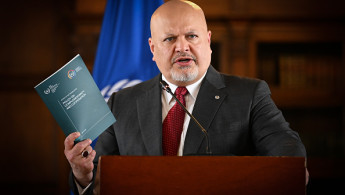The International Criminal Court unsealed war crimes arrest warrants for 6 Libyan suspects
The International Criminal Court unsealed arrest warrants Friday for six men allegedly linked to a brutal Libyan militia blamed for multiple killings and other crimes in a strategically important western town where mass graves were discovered in 2020.
Libya has been in political turmoil since a revolution toppled and killed longtime dictator Muammar Gaddafi in 2011. Since then, Libya has been split between rival administrations in the east and the west, each backed by militias and foreign governments.
ICC Prosecutor Karim Khan said his investigation has gathered evidence “indicating that Tarhunah residents have been subjected to crimes amounting to war crimes, including murder, outrages upon personal dignity, cruel treatment, torture, sexual violence, and rape.”
The court unsealed warrants against six men: Abdelrahim al-Kani, Makhlouf Douma, Nasser al-Lahsa, Mohammed Salheen, Abdelbari al-Shaqaqi and Fathi al-Zinkal.
Khan said that three of the suspects were leaders or senior members of the Al Kaniyat militia that controlled Tarhunah from at least 2015 to June 2020, and three others were Libyan security officials associated with the militia at the time of the alleged crimes.
Warrants for four of the suspects were issued in April 2023 and two more in July of that year but were kept under seal.
“It is now my view that arrest and surrender can be achieved most effectively through the unsealing of these warrants,” Khan said in a statement.
The mass graves were found in Tarhunah after the militia’s withdrawal following the collapse of a 14-month campaign by military commander Khalifa Haftar to wrest control of Tripoli from an array of militias allied with the former U.N.-recognized government.
The ICC does not have a police force and relies on cooperation from its 124 member states to enforce arrest warrants. Khan said his office is “seeking to work closely with Libyan authorities so that these individuals can face the charges against them in a court of law” and working with court officials to seek their arrest.
The court opened an investigation in Libya in 2011 at the request of the U.N. Security Council. It quickly issued warrants for suspects including former dictator Gaddafi, but he was killed before he could be detained and sent for trial. Gaddafi's son, Saif Al-Islam Gadhafi, also is wanted by the court.




 Follow the Middle East's top stories in English at The New Arab on Google News
Follow the Middle East's top stories in English at The New Arab on Google News
![A group of Palestinians, foreign and Israeli activists gather to participated in an olive picking event on the land in the town of Battir, which is under threat of confiscation by Israel in Bethlehem, occupied West Bank on 8 November 2024. [Getty]](/sites/default/files/styles/image_330x185/public/2182930803.jpeg?h=199d8c1f&itok=__0LgGsa)

![People gathered around the rubble of destroyed houses to search for survivors [Getty]](/sites/default/files/styles/image_330x185/public/2024-11/GettyImages-2184733820.jpg?h=199d8c1f&itok=NiM1LO2f)